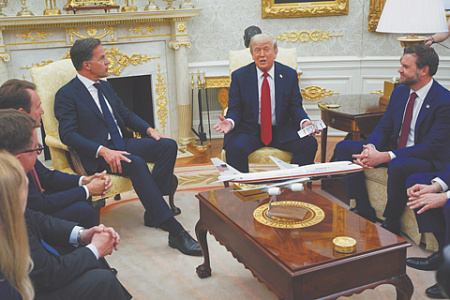
U.S. President Donald Trump has dramatically escalated pressure on Moscow, issuing a 50-day ultimatum for Russia to reach a peace agreement with Kyiv. The announcement, made at the White House, was coupled with a pledge for the first major U.S. arms shipments to Ukraine of his presidency, a stunning policy reversal that coincides with fraught negotiations in Europe over new sanctions against Russia.
At a meeting with NATO Secretary General Mark Rutte, Trump detailed that the new wave of American weaponry for Ukraine would be financed by European allies and coordinated through NATO. The U.S. Ambassador to NATO, Matthew Whittaker, will oversee the effort. This move marks a significant departure from Trump’s previous policy and a partial return to the mechanisms of the prior administration, which he had frequently criticized.
The ultimatum is backed by the threat of severe secondary sanctions. President Trump stated that if a peace deal is not reached within the 50-day window, his administration, with expected support from the Republican-dominated Congress, will impose 100% tariffs on goods from countries that purchase Russian energy. While not naming specific nations, the move implicitly targets major importers like China and India, creating significant global economic uncertainty. Trump has positioned these tariffs as a measure of last resort, retaining personal discretion over their final application.
As Washington signals a tougher stance, the European Union is mired in its own internal disputes. EU foreign ministers gathered in Brussels on Tuesday to finalize an 18th package of sanctions, but preliminary talks among ambassadors revealed deep divisions. The process has been notably difficult, underscoring a persistent lack of unity on how to approach the long-running conflict.
Slovakia has emerged as a primary obstacle, with Prime Minister Robert Fico blocking the package. Fico is demanding guarantees from the European Commission that his country will not be economically harmed by the planned phase-out of Russian gas by 2028, citing risks of energy shortages and a potential €16 billion lawsuit from Russia. In a gesture of protest, Fico sent a lower-ranking diplomat to the ministerial meeting. While a last-minute deal was reportedly reached late Monday, the standoff highlights the complex national interests complicating a unified EU front.
Further complicating matters, Malta has also voiced its opposition to the package. The island nation, which possesses a significant oil tanker fleet, objects to a proposed ‘dynamic price cap’ on Russian oil. This mechanism would set the purchase price at 15% below the market average, a measure that would directly impact Malta’s shipping industry revenues.
The parallel events in Washington and Brussels paint a stark contrast. The United States, with fewer direct economic ties to Russia, can pivot its policy decisively, as demonstrated by Trump’s abrupt ultimatum. Meanwhile, the European Union remains bogged down by complex negotiations, a consequence of decades of deep economic and political integration with Russia. These entanglements make a swift and unified decoupling difficult, revealing persistent fractures within the bloc even as the U.S. signals a new, more confrontational chapter in its policy toward the Kremlin.
